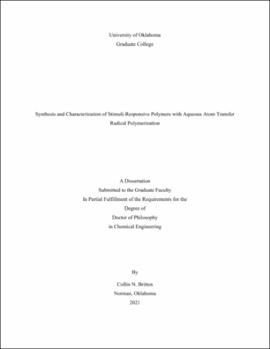| dc.contributor.advisor | Walters, Keisha | |
| dc.contributor.author | Britten, Collin | |
| dc.date.accessioned | 2021-12-14T14:53:15Z | |
| dc.date.available | 2021-12-14T14:53:15Z | |
| dc.date.issued | 2021-09-23 | |
| dc.identifier.uri | https://hdl.handle.net/11244/332314 | |
| dc.description.abstract | In this study the synthesis of hydrophilic, stimuli-responsive polymers is approached with the goal to optimize their synthesis in terms of quality of product as well as overall user-friendliness of the polymerization scheme. Though many reversible deactivation radical polymerization (RDRP) schemes have been described, many to date require either extensive degassing and polymerization under very tightly control oxygen-free conditions, prohibitively long reaction times, or harsh reagents/conditions to drive the polymerization to completion. Through careful optimization, the use of aqueous Cu0-mediated atom transfer radical polymerization is demonstrated as a polymerization technique with relatively rapid kinetics (99% conversion in t = 3 hr vs t > 8 hr for non-aqueous systems), well-defined control over final molecular weight distributions (polydispersity index Ð < 1.2), and a high tolerance to oxygen. This system eliminates the need for the extensive degassing protocols often associated with RDRP reactions, with no detrimental effect observed on the final molecular weight distributions. This eliminates a tedious step in reaction preparation and presents a significant step towards a robust reaction system that can be readily implemented beyond the laboratory scale. This system is also demonstrated to apply well to acidic monomers in the form of phosphate-laden hydrogels. Exchange of the activating/reducing agent for the catalyst system from copper metal to ascorbic acid enables the direct synthesis of phosphate-pendant hydrogels with greater phosphate content than previously reported, using an internal diene impurity in the commercially sourced monomer as its own crosslinker. Careful optimization reveals this route to yield hydrogels with high swellability (water uptake > 6,000% w/w) despite higher crosslinker concentration than is typically thought feasible for the synthesis of well-defined hydrogels (ca. 16 mol%). These conditions establish the groundwork for synthesizing these hydrogels under the most extreme condition, establishing a toolset to slowly dilute with secondary monomers for targeting specific mechanical properties in response to changes in pH, ionic strength, and cation structure. Finally, the pH- and temperature-responsive behavior of poly(2-[dimethylamino]ethyl methacrylate) (PDMAEMA) are considered, with emphasis on understanding the role of individual variables that have often been convoluted in prior studies. Careful assessment suggests a large enthalpy of protonation (ΔH = -89 kJ/mol) that drives the dissociation of the polymer pendant groups as solutions are heated, heavily coupling the temperature and pH responsiveness. Preliminary results suggest this relationship between temperature and protonation may be a more predictive tool for interpreting the temperature responsiveness of PDMAEMA. These results provide a theoretical basis to establish this connection across additional conditions and other polymers, improving the understanding the fundamental thermodynamic processes that drive this equilibrium. | en_US |
| dc.language | en_US | en_US |
| dc.rights | Attribution-NonCommercial-ShareAlike 4.0 International | * |
| dc.rights.uri | https://creativecommons.org/licenses/by-nc-sa/4.0/ | * |
| dc.subject | Polymer synthesis | en_US |
| dc.subject | Stimuli-responsive polymer | en_US |
| dc.subject | ATRP | en_US |
| dc.title | Synthesis and Characterization of Stimuli-Responsive Polymers with Aqueous Atom Transfer Radical Polymerization | en_US |
| dc.contributor.committeeMember | Lobban, Lance | |
| dc.contributor.committeeMember | Harwell, Jeffrey | |
| dc.contributor.committeeMember | O'Rear, Edgar III | |
| dc.contributor.committeeMember | Rice, Charles | |
| dc.date.manuscript | 2021-09-13 | |
| dc.thesis.degree | Ph.D. | en_US |
| ou.group | Gallogly College of Engineering::School of Chemical, Biological and Materials Engineering | en_US |
| shareok.orcid | 0000-0002-7593-0996 | en_US |
| shareok.nativefileaccess | restricted | en_US |

